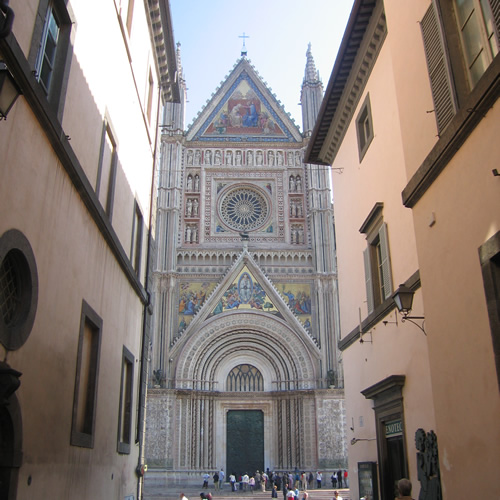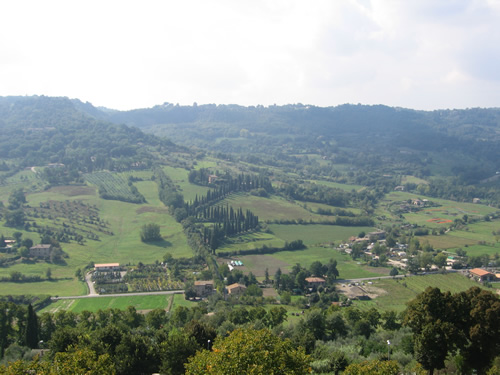A School for Italian Language Learning in Orvieto, Italy
Benefit from High-Quality Academics and Everyday Culture
By Diana Saluri Russo

|
One approach, via narrow road, to the breathtaking cathedral in Orvieto.
Photo © TransitionsAbroad.com.
|
In October, on sabbatical from my college teaching job, I attended LinguaSí, a small language school in the spectacular medieval hill town
of Orvieto, Italy. Although I had only two weeks to spend, I did not take the choice of a language school lightly. I had a particularly bad experience in a large language school in Rome 10 years earlier — teachers who treated students
with contempt, smoke-filled classrooms, and confused administrators.
The relatively new LinguaSí (1998) seemed to offer the kind of language experience I was looking for: the conversation practice and interaction with locals that adults who can only stay a few weeks crave.
And it is in one of the most serenely beautiful regions in Italy, Umbria, in one of my all-time favorite Italian towns.
The Italian Language Classes
The school facility is small and there were only 13 students enrolled during my 2-week stay. Students were, I happily discovered, a mix of ages and nationalities. (During the summer months enrollment is higher and
students tend to be younger.)
The school uses the communication-based teaching method, which stresses the ability to communicate with native speakers in “live” settings. In class we read and discussed newspapers articles, listened
to recordings of live conversations between native speakers, and did role plays.
Under the communication method, grammar is also taught differently: students develop hypotheses about the structure of the language and play them out on their own, although I didn’t see much evidence of this
approach.
I was in the advanced class and had no problem with the school’s all-Italian immersion approach, but some of the students in the introductory level class said it could be difficult, particularly when studying
grammar.
What I appreciated most about LinguaSí, given my previous experience at the school in Rome, was the very professional and sincere approach to the academic program and to teaching.
Instructors are chosen from attendees (2-3 out of 15-20) at an annual training course organized by the school. Class size is limited to eight students. There is an interview with the school’s course director,
Alessandra Mallozzi, the first day to determine placement levels.
Terminally restless, I had feared the 4-hour morning class period, but our teacher was nearly perfect. Her warmth, efficiency, and liveliness as she led the class participation made me wish the
class would go on even longer.
At break time, we met up with students from the beginning class at the magic coffee machine that dispensed every variety of coffee drink from macchiatos to skinny lattes.
The seriousness of the school’s program is most evident in the staff’s flexibility and determination to give students what they need. One student, an interpreter for the European Union who was more advanced
than the rest of us, was given individual tutoring using readings in her areas of interests — Italian film and textiles. Her instructor also arranged for her to take lessons in lace making, a local specialty.
A young Canadian women in Italy to find a job in computer science received help with writing cover letters and resumes and focused on business terminology.
“We try to guarantee everyone has their level,” said Mallozzi. “One of the most important things is flexibility, this keeps things interesting for the teacher as well. What do you like to do? We
find the materials.”
I was a bit disappointed in opportunities outside the classroom. I would recommend paying the cost for the optional afternoon tutoring sessions (which can double your cost of attending the school). Most of my classmates
did. Left on your own after morning classes, the days can get long, especially if you luck into two weeks of rainy days as I did. Too often I found myself wondering the streets which were getting a little too familiar.
It would have been helpful to have some sort of resource center to go to between or after classes, maybe with DVD/video with headphones, CD rom exercises, and internet access.
Films were offered each week, but once we discovered they lacked subtitles, nearly all stopped attending. (If we could understand Italian films without subtitles, why were we there?)
Cultural Activities
in Orvieto

|
|
The countryside around Orvieto is stunning in its greenery, and not far from other beautiful towns in Umbria.
Photo © TransitionsAbroad.com.
|
There were restaurant dinners with the teachers once a week. Other activities — a hike in the countryside, an excursion to a neighboring town, and an archeological tour of the city — were canceled when not
enough people signed up. This was probably a result of the lower enrollment during the off season. Cooking classes and winery visits are offered at various times during the year; you might inquire specifically about them before you enroll.
Orvieto is less than two hours by train from both Rome and Florence, so it presents a great opportunity for weekend getaways. I had imagined weekday afternoon trips by bus to some of my favorite Umbrian towns such
as Perugia and Assisi, but discovered that there are no afternoon buses leaving from Orvieto.
Another seasonal consideration is cold. The school itself was heated with space heaters, but since many Italians do not generally turn on heat until November, late October can be a chilly time indoors.
I definitely recommend the school for the seriousness of its academic program, the dedication of its skilled teachers, and the warm, family atmosphere. This is truly a place where you receive individual attention
and guidance. And in a town like Orvieto you are likely to have more contact with everyday Italian culture than in larger cities like Rome or Florence where you are surrounded by the tourist culture. Maybe it’s just that I’m still
feeling soggy from two weeks of 24-hour rain, but I suggest going in early spring or early fall, when it is warm and dry enough to enjoy Orvieto and the gorgeous surrounding countryside.
Contact: Study Programs in Italy.
Diana Saluri Russo teaches journalism at Clarke College in Dubuque, IA. She travels to Italy frequently.
| 